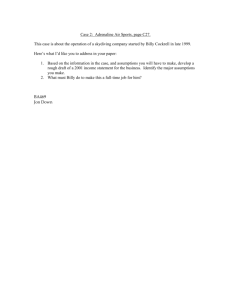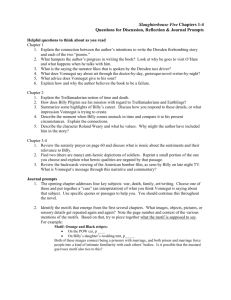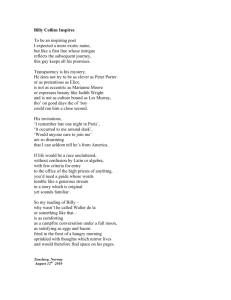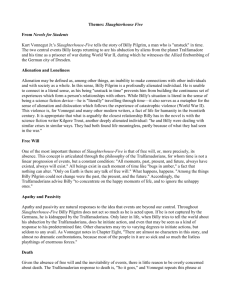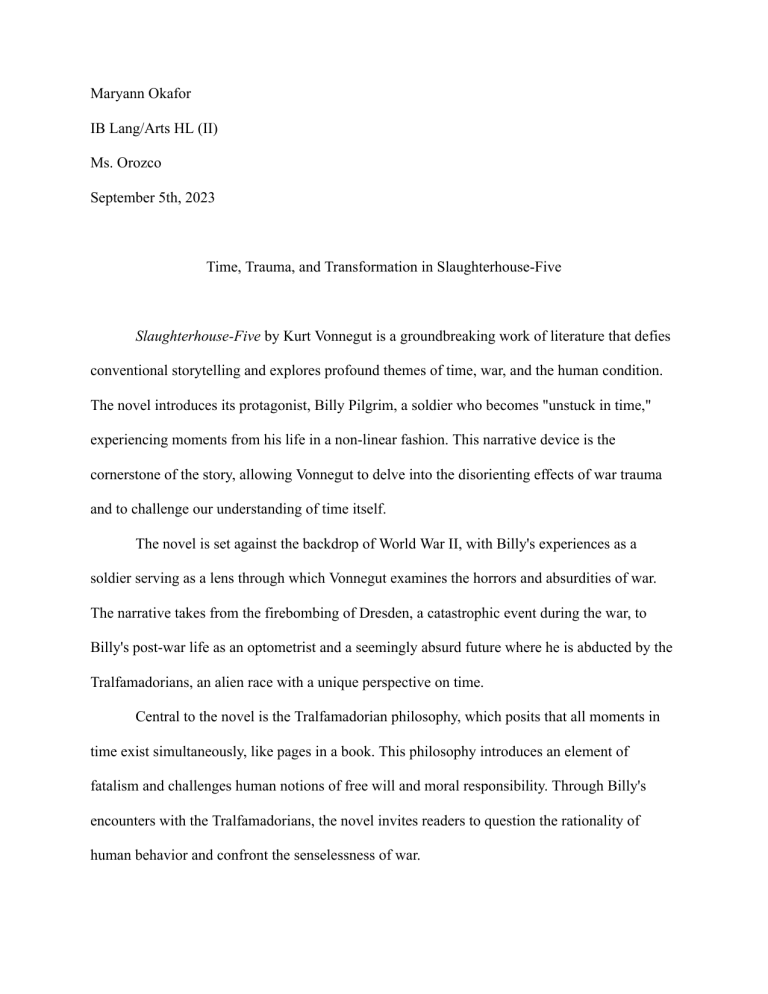
Maryann Okafor IB Lang/Arts HL (II) Ms. Orozco September 5th, 2023 Time, Trauma, and Transformation in Slaughterhouse-Five Slaughterhouse-Five by Kurt Vonnegut is a groundbreaking work of literature that defies conventional storytelling and explores profound themes of time, war, and the human condition. The novel introduces its protagonist, Billy Pilgrim, a soldier who becomes "unstuck in time," experiencing moments from his life in a non-linear fashion. This narrative device is the cornerstone of the story, allowing Vonnegut to delve into the disorienting effects of war trauma and to challenge our understanding of time itself. The novel is set against the backdrop of World War II, with Billy's experiences as a soldier serving as a lens through which Vonnegut examines the horrors and absurdities of war. The narrative takes from the firebombing of Dresden, a catastrophic event during the war, to Billy's post-war life as an optometrist and a seemingly absurd future where he is abducted by the Tralfamadorians, an alien race with a unique perspective on time. Central to the novel is the Tralfamadorian philosophy, which posits that all moments in time exist simultaneously, like pages in a book. This philosophy introduces an element of fatalism and challenges human notions of free will and moral responsibility. Through Billy's encounters with the Tralfamadorians, the novel invites readers to question the rationality of human behavior and confront the senselessness of war. Furthermore, "Slaughterhouse-Five" explores the psychological toll of war and trauma on individuals, as Billy's time travel can be seen as a coping mechanism to escape the horrors of the present. His fragmented memories and detachment from reality mirror the experiences of those suffering from post-traumatic stress disorder. Character Development In Slaughterhouse-Five, character development is a complex and often unconventional journey that challenges traditional storytelling conventions. The novel's protagonist, Billy Pilgrim, undergoes a transformation that is deeply rooted in the trauma of war and the novel's exploration of time and reality. At the outset of the story, Billy is introduced as a meek and passive character. As an infantryman in World War II, he is completely unprepared for the brutality and chaos of war. His journey as a soldier is marked by a profound sense of powerlessness and detachment. He is not the heroic figure typical of war narratives; instead, he becomes a symbol of the ordinary, vulnerable soldier who is swept up in the madness of combat. Billy's initial inability to function as a soldier reflects the devastating impact of war on an individual's psyche. However, it is through the lens of time travel and his "unstuck" experiences that Billy's character development takes its most unconventional turn. He becomes aware of events from his past, present, and future simultaneously, and this awareness reshapes his outlook on life. His time with the Tralfamadorians, who view time as a series of moments, allows him to adopt a more fatalistic perspective, where everything is predetermined and unchangeable. This transformation serves as a defense mechanism against the trauma of war, providing him with a sense of detachment from the atrocities he witnesses. Billy's character, as shaped by his time travels, illustrates Vonnegut's larger commentary on the dehumanizing effects of war. Billy's detachment is not a sign of strength but rather a manifestation of the profound disconnection from reality that war inflicts on individuals. His inability to communicate his experiences effectively to others underscores the isolation that many veterans feel when trying to convey the horrors of war to those who haven't experienced it. Moreover, Billy's character development challenges the conventional notions of heroism and agency. He doesn't fit the mold of the traditional war hero; instead, he represents the countless individuals who are profoundly affected by the senselessness of conflict. His transformation is a testament to the enduring psychological scars that war leaves on those who survive it. Relation to Contemporary Issues Slaughterhouse-Five, despite being a novel rooted in the context of World War II, remains strikingly relevant to contemporary issues. Vonnegut's timeless exploration of war, trauma, and the human condition continues to resonate with modern readers, offering valuable insights into the complexities of our world today. One of the most enduring themes in the novel, which remains highly pertinent, is its searing critique of war. Through the lens of Billy Pilgrim's experiences as a soldier in the midst of the senseless destruction of Dresden, Vonnegut vividly illustrates the horrors of conflict. The devastating consequences of war, as portrayed in the novel, serve as a stark reminder of the human cost of armed conflicts. In an era where conflicts continue to ravage nations and regions across the globe, Slaughterhouse-Five serves as a powerful anti-war statement, urging us to confront the futility and brutality of such endeavors Moreover, the novel's exploration of post-traumatic stress disorder in Billy Pilgrim offers a lens through which we can view contemporary issues related to mental health and the well-being of veterans. The psychological trauma that Billy experiences is a poignant reflection of the challenges many veterans face upon returning from war zones. This aspect of the novel underscores the importance of addressing the mental health needs of those who have served in the military, shedding light on the long-lasting and often invisible scars of war. Vonnegut's narrative experimentation, with its fractured timeline and non-linear structure, also speaks to contemporary discussions around storytelling and the nature of truth. In a world increasingly saturated with information and often conflicting narratives, the novel challenges us to reconsider how we perceive reality and construct our own narratives. This is particularly relevant in the age of "fake news" and the ongoing debates about the reliability of information sources. Additionally, the Tralfamadorian philosophy, which Billy Pilgrim adopts, prompts us to reflect on our own beliefs and perspectives. In a time when diverse worldviews and cultural perspectives intersect and collide, the novel's exploration of differing philosophies of time and existence encourages us to embrace empathy and openness to alternative perspectives. Personal Connection: Reading "Slaughterhouse-Five" was a profoundly moving and thought-provoking experience that left an indelible mark on my understanding of war, time, and human nature. Kurt Vonnegut's unconventional narrative style and poignant storytelling drew me into the depths of the novel's themes in a way that felt deeply personal. One of the most striking aspects of the book for me was its portrayal of the trauma of war. Vonnegut's depiction of Billy Pilgrim's disconnection from reality, his struggle to articulate the horrors he witnessed, and his retreat into a non-linear perception of time resonated with me on a visceral level. It made me reflect on the often unseen and long-lasting psychological scars that war inflicts on individuals. It helped me empathize more deeply with the veterans I've known, recognizing that their experiences, like Billy's, are far more complex and painful than can be captured by simple narratives of heroism. The novel's exploration of time as a fluid and non-linear concept was both mind-bending and illuminating. It challenged my preconceived notions of time as a linear progression of events. Through Billy's experiences, I came to appreciate the relativity of time and the idea that moments from our past, present, and future are intertwined in ways we may not fully grasp. It made me ponder the nature of memory and how it shapes our understanding of our own life stories. Moreover, Slaughterhouse-Five compelled me to contemplate the senselessness of war and the human capacity for cruelty. The depiction of the Dresden bombing, a real historical event that resulted in unimaginable devastation, served as a stark reminder of the destructive potential of human conflict. It deepened my conviction that we must continually strive for peace and understanding, recognizing the futility of violence as a means of resolving differences. In a broader sense, the novel's exploration of the Tralfamadorian philosophy and its acceptance of fatalism raised questions about the nature of free will and the human quest for meaning. It prompted me to consider the choices we make in our lives and the extent to which they are predetermined by circumstances beyond our control.
